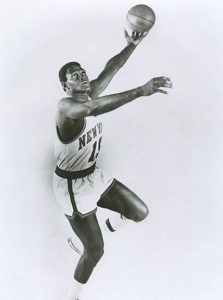Willis Reed
NBA player Willis Reed first garnered national attention as a standout at Grambling State University.

Courtesy of Wikimedia Commons
Will Reed. New York Knicks (Publisher)
The contrast between Willis Reed’s birthplace of the little crossroads settlement of Hico, Louisiana, in Lincoln Parish, and the circumstance of his greatest career triumph—Game 7 of the 1970 National Basketball Association (NBA) Finals at New York City’s Madison Square Garden—couldn’t be more sharply drawn. Reed was born June 25, 1942, into an African American family determined to see him educated in the segregated South. Hailing from rural northern Louisiana—he grew up on a farm in Bernice and attended tiny West Side High School in Lillie—Reed went on to achieve a Hall of Fame career with the New York Knicks. He ended up providing one of the most memorable and inspiring moments in basketball history, which led his team to a championship.
After playing spectacular basketball for the first five games of the championship series between Reed’s New York Knicks and the Los Angeles Lakers, Reed sustained a deep thigh injury that kept him out of Game 6, in which the Lakers pounded the Knicks to tie the series at three games apiece. Reed wasn’t expected to start Game 7, either, but just as the two teams were taking the court, Reed limped out of the Knicks’ locker room with his thigh heavily wrapped. The partisan New York crowd responded with wild cheering, and Reed went on to win the opening tip over Wilt Chamberlain and, amazingly, score the contest’s first four points. Inspired by Reed’s effort, the Knicks went on to beat the Lakers and win what still stands as the franchise’s last NBA championship.
Reed first garnered national attention as a standout at Grambling State University, totaling nearly 2,300 collegiate points and leading the Tigers to a National Association of Intercollegiate Athletics championship and three Southwestern Athletic Conference crowns. Drafted by the Knicks in 1964, Reed immediately helped bolster a moribund franchise that gradually developed into a winner with a team that comprised three other eventual Hall of Famers, including future US Senator Bill Bradley. The group relied heavily on teamwork and role playing, with Reed providing a steadfast presence inside as well as a deft jump shot.
After his retirement as a player, Reed found additional success as a coach and an executive at the collegiate and professional levels: he coached the Knicks for just over a year before moving into the collegiate coaching ranks for several years. After joining the coaching staff of the NBA’s Atlanta Hawks in 1985, Reed became head coach of the New Jersey Nets before moving into that team’s front office. In 2003 Reed’s professional career came full circle when he joined the Knicks’ front office staff. He was inducted in the Naismith Memorial Basketball Hall of Fame in 1982.
